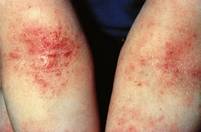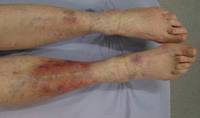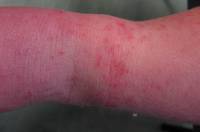Dermatology at Poole Hospital
The dermatology service provides the diagnosis and management of a wide range of skin diseases for both adults and children. This includes inflammatory skin diseases, skin surgery, dermatitis patch testing, laser treatment and mole mapping. Both inpatient and outpatient facilities are available at Poole Hospital.
The services offered by dermatology include:
- Diagnosis and management of skin disease in adults and children
- Skin surgery – treatment of pre-malignant and malignant skin disease under local anaesthetic
- Skin grafts
- Laser treatment of skin lesions
- Mole mapping
- Leg ulcer clinics (nurse led)
- Patch testing service
- Cryotherapy of benign and pre-malignant lesions
- Phototherapy – PUVA (topical and oral) and narrowband UVB treatment of dermatosis
- Day treatment – topical applications for inflammatory dermatosis, including wet and dry wrapping
- Photodynamic therapy of pre-malignant lesions
Please see the below documents on how to send photos to us (for Poole Hospital dermatology patients only).
- Using the secure image transfer service
- How to take a photo
- Link to Poole secure image transfer service
About eczema - the itchy skin condition
Eczema can affect people of all ages and can be a long term problem, it has a big impact on people's lives.
Eczema causes redness, dryness and itching of the skin which can affect how you sleep, your ability to concentrate and your self-confidence, particularly if it is active and getting worse (flaring). But there is help out there, the right treatment can really help a person cope with the problem, getting into good skin care habits and following a regular treatment plan can really help
In the dermatology department at Poole Hospital, doctors and nurse specialists see patients who have been referred by their GPs with difficult to control eczema. They give information about what causes eczema and can help make sense of why treatments are important and how to use them.
Advice to help control the itchy skin condition
- Avoid products that can irritate the skin (irritants) that can cause inflammation and dryness such as soap and shower gels. If you have sensitive skin, give perfumed products a miss - look for the words 'parfum' or 'aroma' in the ingredients list as even products labelled as 'fragrance-free' can contain this
- Dry skin is prone to getting eczema - regular and generous use of the right emollients (moisturisers) formulated for eczema helps to reduce the dryness that causes eczema and is a really important part of treatment. A good time to use your emollient is after bathing or showering
- Using emollient twice a day, and more often if the eczema is severe, can help to reduce the amount of steroid cream needed to treat eczema in the long run
- When showering or bathing, use products that help increase the moisture in the skin rather than normal shower gels and soaps that remove oil from the skin and dry it out. Good products to use include bath oils (non-perfumed ones), emollient-based soap substitutes and shower emollients formulated for eczema. Your pharmacist can advise about this.
- Don't use aqueous cream as a moisturiser for eczema because it contains a detergent called SLS which can irritate the skin and make eczema worse.
- Scratching and rubbing the skin when the eczema is bad can actually make the problem even worse – this is known as the 'itch-scratch cycle'.
- Don't stop using your moisturiser when the eczema settles - keeping your skin healthy on a regular basis helps to prevent future flare-ups.
Seek advice if your eczema doesn't get better. Steroid creams prescribed by your doctor can be a very important part of the treatment if the eczema is inflamed and if used in sufficient quantities can make a big difference to how the eczema is controlled.
Some treatments available for severe cases of eczema, if all other treatments have failed, include phototherapy (artificial sunlight) and tablets that help the immune system (immunosuppressants). These are given under the supervision of a dermatologist (a doctor who specialises in seeing people with skin disease and is an expert in treating skin problems).
Some common types of eczema

Infected eczema, bacterial and viral infections can cause eczema to become suddenly worse (or flare) and flares can need treatment with antibiotics as well as steroid creams and emollients.

Venous/varicose eczema - varicose (or venous) eczema can occur on the lower legs in people with varicose veins and causes an itching, redness and dryness of the skin which can sometimes be mistaken for cellulitis (infection). Like other forms of eczema, it responds to treatment with emollients (moisturiser) and steroid creams.

Lichenification is caused by scratching or rubbing the patches of eczema because it is a really itchy - this can cause thickening and creases in the skin - commonly seen behind knees and elbows.









